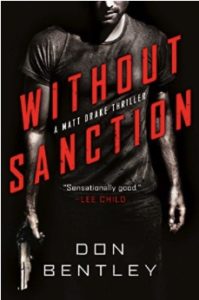4 Tips for Moving from Slush Pile to Sale
We’ve all been there. Revising your work in progress for the forty-seventh time after receiving your forty-sixth rejection. Desperate for a break from the grind, you scroll through Twitter only to see that yet another debut author has come from seemingly nowhere to score a two-book deal with your dream publisher. Suddenly, the chasm separating Twitter and your marked-up manuscript has never seemed wider. How do you bridge the gap from where you are to where you want to be? Well, gather ‘round fellow writers, and I’ll share some tips from folks who have done just that.
First off, I need to lead with a disclaimer. Almost two years ago, I sold my debut novel, Without Sanction, in a two-book deal to Tom Colgan, my dream editor. But before that sale, I spent seventeen years writing and submitting my first three novels which did not sell. In other words, if you’re reading this right now, wondering if you’ll ever have the magical experience of seeing your manuscript on a bookshelf, I am living proof that you can. So let’s talk about how.
Tip 1: Improve Your Craft
I write in the military/espionage thriller genre, and while some of my fellow authors have writing-related degrees or have worked in writing-centric career fields, many others haven’t. Brad Taylor served twenty-one years in the Army, including eight years with Delta Force, prior to writing his first book. Vince Flynn worked in commercial real estate and tended bar, while Tom Clancy was an insurance agent. These authors are now titans in the genre, but they did not earn MFAs or work in writing-centric vocations. You don’t have to either. But this doesn’t mean that you don’t need to understand and improve your craft.
Ask any successful author about their writing process, and he or she will surely point you towards a book or ten. Classics like On Writing by Stephen King, Story by Robert McKee, or Writing the Breakout Novel by Donald Maass are common mentions. Save the Cat! by Blake Snyder and Story Trumps Structure by Steven James are two of my favorites. In addition to reading books on craft, many writers attend writing classes or seminars. When I decided to get serious about my own writing, I took a series of online Writers Digest courses. Writing conferences like ThrillerFest or Bouchercon are also invaluable ways to learn about your craft by meeting successful writers, agents, and editors. Just like any other professional, good writers constantly work to improve their craft.
Tip 2: Study Your Genre
Someone much smarter than me once said that if you want to break into a genre, you need to bring something that’s the same, but different. In other words, understand the genre’s defining conventions, but give readers something that makes your novels distinct. In the military/espionage thriller genre, most protagonists are male. Chris Hauty bucked this trend by anchoring his debut political thriller, Deep State, with female protagonist Hayley Chill.
Readers have responded to his choice enthusiastically. In the same vein, most authors write their protagonists in third-person, but Nelson DeMille authored a series of very successful books utilizing a witty, first-person voice for his John Corey protagonist. In both cases, DeMille and Hauty penned books that fit squarely in their chosen genres, while still distinguishing themselves from the pack by offering readers something slightly different. You should do the same.
Tip 3: Find a Critique Partner
Writing a novel might be the only profession in which you labor in seclusion to produce something that is then rejected for no definable reason. I mean, imagine if you were a carpenter who built a chest of drawers for a client. On delivery day, you show the client the beautiful piece of furniture you slaved over for months only for them to hand you a form rejection letter that says not for me. Crazy right? How are you supposed to learn what they didn’t like about the chest of drawers if they don’t tell you? That’s where a good critique partner comes in. In her wonderfully reserved way, my agent, the fabulous Barbara Poelle, likes to say that you should not share body fluids or familial bonds with your critique partner. In other words, you need someone who can tell you that your baby’s ugly without worrying what you might say the next morning or at Thanksgiving dinner.
Okay, maybe I should have stayed with the chest of drawers analogy. Anyway, to grow as a writer, you need someone who can tell you the unvarnished truth about your work in progress. Bonus points if you’re lucky enough to score someone who can help you smooth out the rough edges in the process. I’ve had many critique partners, but two-time Bram Stoker award winner John Dixon impacted my writing the most. A fantastic novelist in his own right, John wasn’t afraid to point out the good, the bad, and the ugly in my work. Be brave enough to find your own John Dixon. Then, show ‘em your chest of drawers.
Tip 4: Don’t Quit.
This should be obvious, but because we’re writers, it’s not. Life is full of uncertainties, but I can promise you this—you’ll never be published if you quit writing. Everyone loves the Cinderella story about the writer who came from nowhere to score a two-book deal. But most times, that writer has a trunk full of manuscripts that never sold. Fantasy great Brandon Sanderson wrote seven books that never sold. Samantha M. Bailey, whose book Woman on the Edge is currently tearing up the Canadian Fiction bestsellers list, labored for seventeen years before seeing her book on a bookshelf. Nick Petrie’s newly released novel The Wild One is the fifth in his Peter Ash series. Like me, Nick’s first three books didn’t sell, but he wrote one more book called The Drifter. The rest, as they say, is history. Nick, Samantha, Brandon and countless others didn’t quit.
Neither should you.
Join the discussion on Facebook and say hello to Don on Twitter.
 Don Bentley spent a decade as an Army Apache helicopter pilot, and while deployed in Afghanistan was awarded the Bronze Star Medal and the Air Medal
Don Bentley spent a decade as an Army Apache helicopter pilot, and while deployed in Afghanistan was awarded the Bronze Star Medal and the Air Medal
with “V” device for valor.  Following his time in the military, Don worked as an FBI special agent focusing on foreign intelligence and counterintelligence and was a Special Weapons and Tactics (SWAT) team member. His debut novel, WITHOUT SANCTION, is available for pre-order now and hits bookstores on March 3rd, 2020.
Following his time in the military, Don worked as an FBI special agent focusing on foreign intelligence and counterintelligence and was a Special Weapons and Tactics (SWAT) team member. His debut novel, WITHOUT SANCTION, is available for pre-order now and hits bookstores on March 3rd, 2020.





